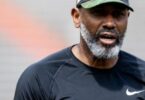ABUJA, Nigeria — Millions of Nigerians returned to the polls on Saturday as Africa’s most populous nation holds gubernatorial elections amid tensions following last month’s disputed presidential vote.
New governors are being chosen for 28 of Nigeria’s 36 states as the opposition continues to reject the victory of President-elect Bola Tinubu of the West African nation’s ruling party.
On Friday, armed security forces were seen patrolling the streets of states where elections were to be held.
“Ahead of the elections, the security situation across the country appears tense, with reports of violence, kidnappings and killings in several states,” Situation Room, a coalition of civil society groups, said in a statement. a statement.
Observers said the presidential election was largely peaceful, but there are still fears of attacks in many parts of Nigeria where armed groups often carry out violent killings, such as in the northwest and south. -East.
At a security briefing in the Nigerian capital this week, Nigeria’s national security adviser, Babagana Monguno, said security forces had been deployed to all hotspots of violence and those responsible were not considered no major security threat.
“We must allow everyone to exercise their fundamental rights as citizens of this country. Anyone who feels like undermining this process should think again,” Monguno said.
Despite being Africa’s largest economy and one of its major oil producers, Nigeria’s development has been stifled by endemic corruption and poor governance, which in many cases implicate governors. Nigeria’s constitution grants tremendous powers to governors, but they are immune from any form of prosecution during their four-year term with a two-term limit.
Despite the powers of governors, polls have shown that many in the West African nation do not have a high level of interest in the election and performance of governors, a trend analysts say affects the level of accountability in the States.
“Even if we get the right president, everything else is against us – members of the National Assembly, governors and structural issues in terms of our constitution,” said Ayisha Osori, director of Open Society Foundations.
Three political parties emerged in the lead among the 18 gubernatorial candidates in the 28 states. And although there is a record 87.2 million registered voters, analysts fear a repeat of low turnout in last month’s presidential poll which saw a voter turnout of 26.7%, the highest low in Nigerian history.
In the capital, Abuja, Kate Imadu, 26, was among many who were unable to vote in the presidential election despite waiting all day and night to vote. It made her less interested in traveling to her town in Cross River State to vote for the next governor, she said.
“What’s the point of traveling when I couldn’t vote here in the presidential election?” Imadu asked, echoing the frustration of many others.
Nigeria’s Independent National Electoral Commission has vowed to address challenges that arose during last month’s elections, such as delays in voting and uploading of results, which opposition parties say have caused deprivation voters’ right to vote and the manipulation of results.
“We have to work harder to overcome the challenges faced in the last elections (because) nothing else will be acceptable to Nigerians,” Mahmood Yakubu, chief electoral officer, told officials in Abuja.


